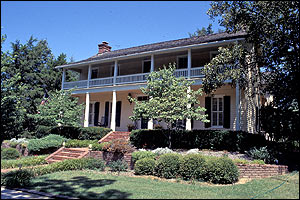Listed in Arkansas Register of Historic Places on 09/01/99
SUMMARY
The Kantz House, built in 1880-1881, is an architecturally significant example of a late 19th-century farmhouse. Despite its relocation around 1983, the removal of an original ell, and the addition of a hyphen and rear section that nearly doubled its size, the original structure, which faces Mission Boulevard, remains a simple, dignified presence in Northwest Arkansas.
ELABORATION
Luke Kantz (1818-1929) fought in the Civil War, practiced law, and taught school before he turned to farming. Kantz was well prepared for the apple boom that occurred in Washington County from the 1880s until 1929. As his children remembered, he raised a small family orchard with 10 to 15 varieties in the 1870s before he became a commercial grower. Kantz worked to improve the quality of his fruit and in the 1890s conducted experiments with and for the horticulture department of the nearby University of Arkansas. Kantz died in his home in 1929, after what a local newspaper editor called "a beautiful and useful life."
Mr. and Mrs. Robert Emenegger now own the structure, now situated in a beautifully landscaped setting.
Despite its relocation and rear additions, the original Kantz House is largely unchanged and remains an important part of the architectural history of Fayetteville and northwest Arkansas. Though no longer eligible for the National Register of Historic Places, the Kantz House deserves recognition on the Arkansas Register under Criterion C with local significance as a simple, Greek Revival-influenced farmhouse from the late 19th century.
BIBLIOGRAPHY
Kantz House National Register nomination, 1980.
Information supplied by Robert Emenegger, 1999.
